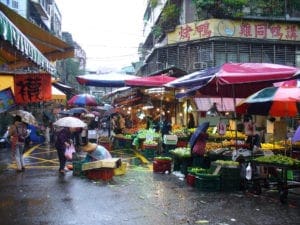Taiwan Streets: a Case of Free Markets in Action
This article was featured in our weekly newsletter, the Liberator Online. To receive it in your inbox, sign up here.
In Liberalism: In the Classical Tradition, Ludwig von Mises explains that classical liberalism “was the first political movement that aimed at promoting the welfare of all, not that of special groups.”
 In an article for the Foundation for Economic Education, Professor Peter St. Onge, a long-time Taiwan resident, discusses a real world example of free markets working to promote the welfare of all members of a community.
In an article for the Foundation for Economic Education, Professor Peter St. Onge, a long-time Taiwan resident, discusses a real world example of free markets working to promote the welfare of all members of a community.
In “Taiwan’s Social Safety Net Is the Street Market,” St. Onge reviews some of the most striking traits of the streets of Taiwan and the state’s loose regulations, giving us a better idea of what Mises wrote nearly 90 years ago.
According to Onge, libertarians and free market apologists are “often ridiculed” when they claim that free enterprise is the best substitute for the welfare state. They are often called naïve for suggesting that fully capable individuals would have a better shot at making a living if they were given freedom instead of government dependence.
In Taiwan, Onge writes, the welfare state is “tiny,” and the regulations aren’t as restrictive when compared to the United States or Europe. The few regulations the state has in place are also lightly enforced.
With the gaps created by government’s hands-off approach in the island of Taiwan, commerce exploded. The result? “Near-zero homelessness.”
The obvious effect of less restrictive regulations is the growth of business, which makes local streets bright with store signs, consumers, and shop keepers. But brick-and-mortar stores are not the only ones benefiting from this freedom. According to Onge, the island hosts a number of pop-up businesses that take over the streets, employing “mainly low-skill labor.” These businesses give the poor and the unskilled the chances that the state’s handouts can’t.
To illustrate his point, Onge writes that, every morning at 5 am, farmers bring their produce to a street close to the university where he works. Using folding tables, they place their products along the street undisturbed. As the diverse sets of customers arrive, the street is filled with color and sound. Some of the customers include the elderly, who aren’t healthy enough to drive to a large store, mothers with small children, and fathers getting ready to cook breakfast. At 7 am, farmers pack up and leave the spots, opening up the space to breakfast pop-ups like noodle shops, sandwich places, and joints offering full English breakfast.
Past noon, these spaces are freed again, giving the night crew time to set up different types of restaurants and stores.
At night, Onge reports, you can buy anything in that street. From fried chicken to kids’ toys. Customers can be seen enjoying the creative madness until 3 in the morning. Just a couple of hours before farmers are ready to unload their produce once again.
This “small river of entrepreneurial income” helps low-skilled workers find jobs, even if temporarily, while also bringing consumers what they want, conveniently.
Instead of crony capitalism, these streets are filled with old-fashioned free markets, allowing competitive enterprise to shape commerce, not government-backed favoritism.
The result is happier customers, more jobs, more safety, and cheaper products.




















